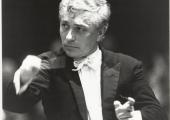BBCSO, Bĕlohlávek, Barbican Hall

Czech master conductor soars to new heights in a Martinů masterpiece
It needs saying yet again, until the message gets through: Bohuslav Martinů is one of the great symphonic masters of the 20th century, and his fellow Czech, chief conductor of the BBC Symphony Orchestra Jiři Bĕlohlávek, once more proves the right man to marshal a golden Martinů revival. It needs saying above all because, for all the beauties and oddities in every bar of the six symphonies, composed at the height of the exiled composer's mastery in America and France between 1942 and 1953, the Third Symphony is perhaps the one which cries out masterpiece from embattled start to shatteringly moving finish. I never thought I'd be writing this, but last night it even outshone by a long way two intriguing but problematic works by Stravinsky and Prokofiev.




